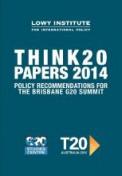As the global upturn continues to bear risks, the issue of economic growth is still a central element of the G20 agenda. The item is connected to macroeconomic imbalances, which rose dramatically before the financial crisis and which are considered a major risk to the stability of the global economic and financial system. As a consequence, the G20 adopted the Framework for Strong, Sustainable and Balanced Growth in 2009, with the objective of reducing macroeconomic imbalances and promoting sustainable growth. In the context of the Framework, the Mutual Assessment Process (MAP) was established to analyse national economic policies and their spillover effects on other countries and on global growth, with the goal of formulating individual adjustment commitments. Since then, the issue has been addressed by the G20 at the highest political level; the success of the Framework and the MAP are closely connected to the success of the G20 as a whole.
Apart from independent and transparent analytical input that helps to identify the imbalances and distortions correctly and in a timely manner, our previous research1 identifies two key criteria that are essential for governing the G20 surveillance process, MAP, successfully. First, a high level of ownership when formulating the targets and reform measures increases political will to commit to a meaningful international surveillance procedure. Second, an effective monitoring and enforcement system helps to maintain commitment and avoid a return to non-cooperative behaviour.
In the spirit of the MAP being a country-led surveillance process, we recommend that the Australian G20 presidency focus on strengthening the peer review capacity of MAP by way of the following four measures: It should (1) ensure specific and timely commitments of the individual G20 members, with a clear focus on spillovers; (2) expand candid discussions based on an ‘explain and justify’ approach to Article 4–type consultations at the G20; (3) introduce clear timetables and a bilateral monitoring process; and (4) streamline the publication of final MAP results into one coherent G20 document.
Improving the peer process of formulating MAP commitments
Compared to the IMF’s surveillance procedure (so-called Article 4 consultations), MAP is very strong on ownership, as the entire process is led and directed by the G20 member states. The basic work of MAP surveillance is done in the Framework Working Group (FWG), which meets several times a year and consists of mid- to high-ranking officials from finance ministries and central banks of the G20 countries. In the meetings, countries usually present their national reform plans, and this is followed by open and candid discussion. The final decisions on Framework commitments are taken by consensus.
These regular exchanges at which representatives from all G20 member states talk openly about their economic policy plans and the international consistency thereof are one of the key added values of the G20 MAP surveillance. Through such regular and candid discussions behind closed doors, trust and understanding can develop among sometimes very different member countries – different both in their level of economic development and their approaches to economic policy-making. The informal and member-driven character of the FWG facilitates the development of common basic understandings, but also sheds light on the views and political constraints of individual states, as a first step toward international cooperation and long-term international policy adjustment.2 Examples of such gradual policy rapprochement in the context of the MAP are China’s gradual changes in its exchange rate policy, and Japan’s VAT increase. Yet this process of formulating individual commitments can be improved.
Recommendation 1
The commitments that are presented by the individual countries must be timely and up to date to form a real basis for discussion. In the context of the 2012 Los Cabos Accountability Assessment Framework (AAF), it was decided that policy commitments should be ‘concrete, using quantitative measures where possible to help focus the discussion and assess progress’.3 The Australian presidency should encourage member states even more explicitly to propose MAP commitments that are as specific as possible in nature and that spell out the potential international spillover effects more clearly.
Recommendation 2
The discussions on adjustment expectations and deliverables in the context of the surveillance exercise should be frank, specific and issue-driven. The Australian presidency should reinforce the ‘explain and justify’ approach for discussing individual commitments in the FWG: countries should explain their suggested reform plans with regard to the anticipated spillovers and effects on global growth. Moreover, member states should stand ready to take comments and criticism from their peers and take account of what kind of deliverables are expected. Explaining and justifying takes place before the final commitments are announced at the yearly G20 summits of the heads of state and governments. For the first time in 2013, each member state was assigned to assess the economic policy plans of another G20 country in the FWG, taking IMF and World Bank reports into consideration. For example, Brazil analysed the German commitments, while Germany reviewed China’s proposals. This is a step in the right direction. In order to make this bilateral assessment a worthwhile exercise, it should be ensured that there is enough room for discussion of individual countries in the future. The Australian presidency should continue and enhance the bilateral peer review in the FWG so as to develop it into an Article 4–type consultation at the G20 – yet one among peers, and on a more informal and flexible basis than at the IMF.
Strengthening the monitoring mechanism for implementing MAP commitments
In contrast to international organisations, the G20 is an informal forum. Because of this, a formal mechanism was not established to monitor and enforce national commitments made in the context of the MAP. It was only under the 2012 Mexican presidency that the G20 started to tackle the issue of non-compliance. In the AAF, the G20 agreed on principles to guide the monitoring and enforcement of its decisions in the future.
The MAP approach to monitoring and enforcement can be described as ‘trust but verify’: the process does not involve any sanctions. Pressure to fulfil the MAP objectives and to change policies is indirect and exerted through a mix of self-assessment, peer review and assessment through international organisations like the IMF. Yet in spite of recent efforts at Los Cabos to enhance monitoring and enforcement of implementation of MAP commitments, the process could be improved through a strengthening of the peer review element of the process.
We acknowledge that peer review bears the inherent danger that the participating countries are the accused, judge and jury at once, which threatens the implementation of politically painful policy adjustments. However, if monitoring mechanisms were equipped with more ‘teeth’, or enforcement was conducted through an outside actor, there would be a dramatic decrease in ownership of the MAP – and thus in the political will to commit to a meaningful international surveillance initiative in the first place.
Recommendation 3
In order to enhance the review capacity of the peers, there must be a clear timetable for the review process. It should follow a yearly cycle, with the presentation of policy commitments at each summit meeting as the starting/end point of the annual review process. National commitments should cover the range of short-, medium-, and long-term goals, and they should all have a clear timetable for implementation and a road map to achieve them that can be easily verified by the peers. In this context, it could be useful for the Australian presidency to expand the process of pairing countries, not only for the formulation stage but also for the monitoring stage of MAP surveillance. Each country would then be responsible not only for assessing the proposed commitments of another member, but also for reviewing the implementation of the policy plans of its partner country in the FWG.
Recommendation 4
The Australian presidency should work towards streamlining the publication of the MAP results. In addition to the individual commitments listed in the action plans, the framework commitments feature in the leaders’ and ministers’ declarations as well as in other G20 work streams – all of which have their own public documents and reports. To improve the visibility and accountability of the MAP commitments it is necessary to put all issues connected to the Framework and MAP together into one single document. This would improve transparency, as the commitments could then be more easily assessed, compared and verified, by both G20 member states and external actors. Moreover, streamlining the documentation of the MAP results would help to focus the activities of the G20 and counter the problem of ‘agenda creep’.
G20 surveillance in the context of the MAP is informal and peer-driven – and consciously so. It is therefore outside of the Australian presidency’s remit to force member states to commit to national rebalancing and growth measures that are domestically unpopular or unfeasible. Nor is the G20 presidency in a position to make member states agree on a common vision for the global economy, when in fact they diverge in outlook and economic philosophy. However, during its 2014 presidency, the Australian government can work towards improving the governance of the MAP surveillance by strengthening the discussion, formulation and monitoring of national rebalancing and growth commitments in a peer-review process.
- 1Katharina Gnath and Claudia Schmucker (forthcoming), ‘Governing Macroeconomic Surveillance in the G20 and the EU: A First Assessment of MAP and MIP’.
- 2See also Claudia Schmucker and Katharina Gnath, ‘The G20 Five Years On: Focus on the Core Tasks!’, 2013, DGAPanalysis 5/2013, German Council on Foreign Relations, Berlin, https://dgap.org/en/think-tank/publications/dgapanalyse-compact/g-20-fi….
- 3G20, Los Cabos Growth and Jobs Action Plan, www.g20.utoronto.ca/2012/2012-0619-loscabos-actionplan.html.


